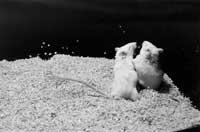Social behavior and immune system
Since ancient times it was detected that psychosocial factors such as emotional experience, identity, how to cope with stress, etc. could influence the kindness and development of the disease. A hundred years ago, since it was discovered that those responsible for infectious diseases were pathogens, the main objective of biomedical sciences was to investigate how to control and eliminate these agents, leading to a very important development of antibiotics. In recent years, however, interest in investigating the incidence of psychosocial factors in diseases has resurfaced, including cancer, autoimmune diseases and infectious diseases.

Consequently, much work has been done, both with animals and with humans, to study the effects of stress situations on immunity reaction and to know the physiological mechanism through which the brain controls the activity of the immune system. The result of these studies has been the description of two main connection routes between these two systems. On the one hand, it has been shown that the sympathetic nervous system directly inerts the immune organs (spleen, thymus...) and that nerve endings affect lymphocytes. On the other hand, the neuroendocrine link is explained through the hypothalamic-hypophysia-adrenal axis, so that the brain can communicate with the organs of the immune system through hormones and neurotransmitters that can influence immune function.
This conceptual context, that of psychology, is the framework of our work. Thus, our research can be divided into two main lines:
1. A line of research focuses on the research of neuroendocrinoimmune regulation phenomena of laboratory mice in the situation of social conflicts and agonistic behaviors.
- Aggressive competitions are formed between male mouse pairs and through behavioral evaluation techniques experimental subjects with experiences of domination and subdomain are selected.
- In each group with behavioral differences, the effects produced in immune reactivity are analyzed by removing the spleen, measuring the reproductive capacity of mononuclear cells, and measuring the production of 1 interleucine and 2 interleucine.
- Blood samples measure levels of corticosteroid and prolactin that can mediate among the effects of stress on immune activity.
2. In the other line of work we have worked with humans and analyzed the relationship between the social behavior of preschool children and sensitivity to the disease, taking into account some hormonal mechanisms through which this relationship is articulated. Our initial hypothesis is that certain social behaviors that occur in children show correlations with the facilities to diseases. Children who have a behavioral profile that reflects a higher level of stress may be thought to have a greater ease with the disease (at least if there is reason to think). To solve this problem, we analyze the behavior of preschool children towards their classmates, observing nonverbal communication. This communication system is a very useful index to know the child's relationship capacity in the stages in which speech capacity is still developing.
Thus, the game, aggression, coalition, etc. are observed on many levels. Measurements of the activity of the immune system (saliva samples are collected and immunoglobulin A levels are measured) are performed to assess the facility with the disease, and children's pediatricians are asked to follow a protocol on the ease with the child's disease. Finally, to analyze some intermediate hormonal mechanisms of this relationship between behavior and ease with the disease, cortisol levels are studied (by saliva and urine samples). Cortisol is a hormone that provides a stress index and is an endocrine parameter (immunosuppressive effect) that mediates the activity of the immune system.
- Project title: Social behavior and immune system
- Project objective: Confirm whether certain social behaviors in children are correlated with ease of illness
- Directors: A. Azpiroz and J.R. Sánchez
- Working team: L. Garmendia, A. Arrangement, E. Fano, G. Beitia, I. Leclerc, R. Cacho, L. Ahedo, J. Cardas and O. Vegas
- Department: Basic Psychological Processes and Development
- Centre: Faculty of Psychology of San Sebastian.





